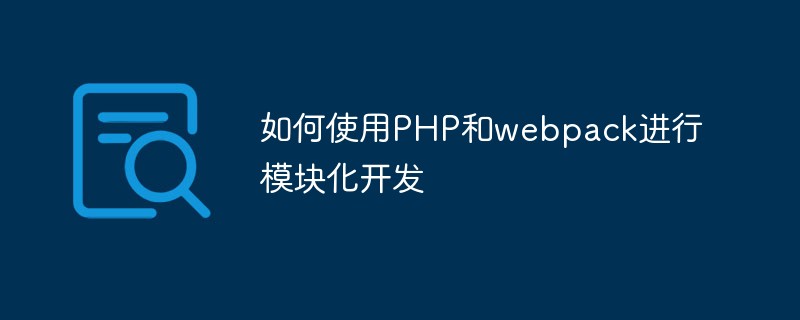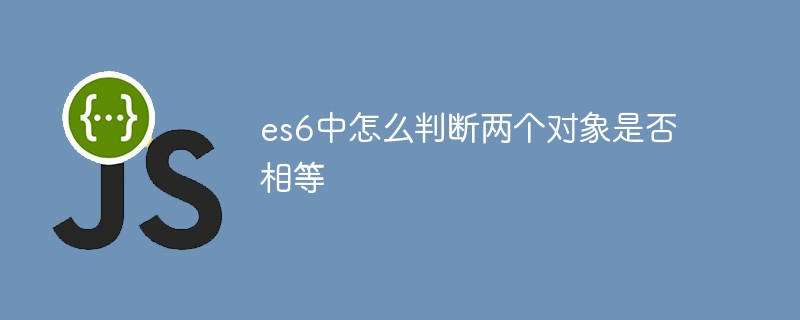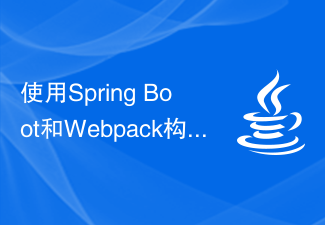Webpack supports es6. Webpack 2 supports native ES6 module syntax, which means developers can use import and export without introducing additional tools like babel. But if you use other ES6 features, you still need to introduce the babel tool.

The operating environment of this tutorial: Windows 7 system, ECMAScript version 6, Dell G3 computer.
Module methods
When packaging your application with webpack, you can choose from various module syntax styles, including ES6, CommonJS and AMD.
Although webpack supports multiple module syntaxes, we still recommend using a consistent syntax as much as possible to avoid some strange behaviors and bugs. In fact, webpack enables syntax consistency checking when the nearest package.json file contains a "type" field with a value of "module" or "commonjs". Please pay attention to this before reading:
-
Set "type": "module" for .mjs or .js in package.json
-
CommonJS is not allowed, for example, you cannot use require, module.exports or exports
When importing a file, it is mandatory to write an extension, for example, you should use import '. /src/App.mjs' instead of import './src/App' (you can disable this rule by setting Rule.resolve.fullySpecified)
-
-
Set "type": "commonjs" in package.json for .cjs or .js
Both import and export are not available
-
Set "type": "module" for .wasm in package.json
When introducing a wasm file, you must write the file extension
ES6 (recommended)
webpack 2 supports native ES6 module syntax, which means you don’t need to introduce additional tools like babel , you can use import and export. But note that if you use other ES6 features, you still need to introduce babel. webpack supports the following methods:
import
## Use import to statically import another module exported through export.import MyModule from './my-module.js';
import { NamedExport } from './other-module.js';
Warning: The keyword here is static. In the standard import statement, the module statement cannot introduce other modules in a dynamic way that "has logic or contains variables". More information about import and dynamic usage of import().You also introduce Data URI through import:
import 'data:text/javascript;charset=utf-8;base64,Y29uc29sZS5sb2coJ2lubGluZSAxJyk7';
import {
number,
fn,
} from 'data:text/javascript;charset=utf-8;base64,ZXhwb3J0IGNvbnN0IG51bWJlciA9IDQyOwpleHBvcnQgY29uc3QgZm4gPSAoKSA9PiAiSGVsbG8gd29ybGQiOw==';
export
Export the entire module or named by default Export module.// 具名导出
export var Count = 5;
export function Multiply(a, b) {
return a * b;
}
// 默认导出
export default {
// Some data...
};
import()
function(string path):Promise
Tip: The ES2015 Loader specification defines the import() method to dynamically load ES2015 modules at runtime. if (module.hot) {
import('lodash').then((_) => {
// Do something with lodash (a.k.a '_')...
});
}
Warning: The import() feature relies on built-in Promise. If you want to use import() in older browsers, remember to use a polyfill library like es6-promise or promise-polyfill to pre-populate (shim) the Promise environment.
Expressions in import()
cannot use fully dynamic import statements, such as import(foo). is because foo could be any path to any file in your system or project. import() must contain at least some path information about the module. Packaging can be limited to a specific directory or set of files, so that when using dynamic expressions - every module that may be requested in an import() call is included. For example, import(`./locale/${language}.json`) will package each .json file in the .locale directory into a new chunk. At runtime, after the variable language has been evaluated, any file like english.json or german.json can be used.// 想象我们有一个从 cookies 或其他存储中获取语言的方法
const language = detectVisitorLanguage();
import(`./locale/${language}.json`).then((module) => {
// do something with the translations
});
Tip:Using the webpackInclude and webpackExclude options allows you to add regular expression patterns to reduce the number of files imported by webpack.
Magic Comments
Inline comments enable this feature. By adding comments in the import, we can do things like name the chunk or select a different mode.// 单个目标
import(
/* webpackChunkName: "my-chunk-name" */
/* webpackMode: "lazy" */
/* webpackExports: ["default", "named"] */
'module'
);
// 多个可能的目标
import(
/* webpackInclude: /\.json$/ */
/* webpackExclude: /\.noimport\.json$/ */
/* webpackChunkName: "my-chunk-name" */
/* webpackMode: "lazy" */
/* webpackPrefetch: true */
/* webpackPreload: true */
`./locale/${language}`
);import(/* webpackIgnore: true */ 'ignored-module.js');
webpackIgnore: When set to true, disables dynamic import parsing.
Warning: Note: Setting webpackIgnore to true will not perform code splitting.
webpackChunkName: The name of the new chunk. Starting with webpack 2.6.0, the placeholders [index] and [request] support incremented numbers or actual parsed filenames respectively. After adding this annotation, the individual chunks given to us will be named [my-chunk-name].js instead of [id].js.
webpackMode: Starting with webpack 2.6.0, you can specify a different mode to parse dynamic imports. The following options are supported:
'lazy'(default value): Generate a lazy-loadable module for each import() imported module. chunk.'lazy-once': Generates a single lazy-loadable chunk that can satisfy all import() calls. This chunk will be obtained on the first import() call, and subsequent import()s will use the same network response. Note that this mode only makes sense in some dynamic statements, such as import(`./locales/${language}.json`), which may contain multiple requested module paths.'eager': No additional chunks will be generated. All modules are imported by the current chunk and no additional network requests are made. However, a Promise in resolved state will still be returned. In contrast to static imports, the module will not be executed until the call to import() completes.'weak': Try to load the module, if the module function has been loaded in other ways, (that is, another chunk has imported this module, or contains the module script is loaded). A Promise will still be returned, but will only be resolved successfully if the chunk is already available on the client. If the module is not available, a rejected Promise is returned and the network request is never executed. This is useful for Universal Rendering (SSR) when the required chunks are always provided manually in the initial request (embedded in the page), rather than when the application navigation is triggered on a module import that was not initially provided.
webpackPrefetch: Tells the browser that this resource may be needed for certain navigation jumps in the future.
webpackPreload: Tells the browser that the resource may be needed during the current navigation.
webpackInclude: Regular expression used for matching during import resolution. Only matching modules will be packaged.
webpackExclude: Regular expression used for matching during import resolution. All matching modules will not be packaged.
webpackExports: Tell webpack to only build dynamic import() modules with specified exports. It can reduce chunk size. Available from webpack 5.0.0-beta.18 onwards.
[Related recommendations: javascript learning tutorial]
The above is the detailed content of Does webpack support es6?. For more information, please follow other related articles on the PHP Chinese website!
 VUE3入门教程:使用Webpack进行打包和构建Jun 15, 2023 pm 06:17 PM
VUE3入门教程:使用Webpack进行打包和构建Jun 15, 2023 pm 06:17 PMVue是一款优秀的JavaScript框架,它可以帮助我们快速构建交互性强、高效性好的Web应用程序。Vue3是Vue的最新版本,它引入了很多新的特性和功能。Webpack是目前最流行的JavaScript模块打包器和构建工具之一,它可以帮助我们管理项目中的各种资源。本文就为大家介绍如何使用Webpack打包和构建Vue3应用程序。1.安装Webpack
 vite和webpack的区别是什么Jan 11, 2023 pm 02:55 PM
vite和webpack的区别是什么Jan 11, 2023 pm 02:55 PM区别:1、webpack服务器启动速度比vite慢;由于vite启动的时候不需要打包,也就无需分析模块依赖、编译,所以启动速度非常快。2、vite热更新比webpack快;vite在HRM方面,当某个模块内容改变时,让浏览器去重新请求该模块即可。3、vite用esbuild预构建依赖,而webpack基于node。4、vite的生态不及webpack,加载器、插件不够丰富。
 如何使用PHP和webpack进行模块化开发May 11, 2023 pm 03:52 PM
如何使用PHP和webpack进行模块化开发May 11, 2023 pm 03:52 PM随着Web开发技术的不断发展,前后端分离、模块化开发已经成为了一个广泛的趋势。PHP作为一种常用的后端语言,在进行模块化开发时,我们需要借助一些工具来实现模块的管理和打包,其中webpack是一个非常好用的模块化打包工具。本文将介绍如何使用PHP和webpack进行模块化开发。一、什么是模块化开发模块化开发是指将程序分解成不同的独立模块,每个模块都有自己的作
 es6中怎么判断两个对象是否相等Apr 19, 2022 pm 03:34 PM
es6中怎么判断两个对象是否相等Apr 19, 2022 pm 03:34 PM在es6中,可用Object对象的is()方法来判断两个对象是否相等,该方法检测两个变量的值是否为同一个值,判断两个对象的引用地址是否一致,语法“Object.is(对象1,对象2)”;该方法会返回布尔值,若返回true则表示两个对象相等。
 vue webpack可打包哪些文件Dec 20, 2022 pm 07:44 PM
vue webpack可打包哪些文件Dec 20, 2022 pm 07:44 PM在vue中,webpack可以将js、css、图片、json等文件打包为合适的格式,以供浏览器使用;在webpack中js、css、图片、json等文件类型都可以被当做模块来使用。webpack中各种模块资源可打包合并成一个或多个包,并且在打包的过程中,可以对资源进行处理,如压缩图片、将scss转成css、将ES6语法转成ES5等可以被html识别的文件类型。
 Webpack是什么?详解它是如何工作的?Oct 13, 2022 pm 07:36 PM
Webpack是什么?详解它是如何工作的?Oct 13, 2022 pm 07:36 PMWebpack是一款模块打包工具。它为不同的依赖创建模块,将其整体打包成可管理的输出文件。这一点对于单页面应用(如今Web应用的事实标准)来说特别有用。
 webpack怎么将es6转成es5的模块Oct 18, 2022 pm 03:48 PM
webpack怎么将es6转成es5的模块Oct 18, 2022 pm 03:48 PM配置方法:1、用导入的方法把ES6代码放到打包的js代码文件中;2、利用npm工具安装babel-loader工具,语法“npm install -D babel-loader @babel/core @babel/preset-env”;3、创建babel工具的配置文件“.babelrc”并设定转码规则;4、在webpack.config.js文件中配置打包规则即可。
 使用Spring Boot和Webpack构建前端工程和插件系统Jun 22, 2023 am 09:13 AM
使用Spring Boot和Webpack构建前端工程和插件系统Jun 22, 2023 am 09:13 AM随着现代Web应用程序的复杂性不断增加,构建优秀的前端工程和插件系统变得越来越重要。随着SpringBoot和Webpack的流行,它们成为了一个构建前端工程和插件系统的完美组合。SpringBoot是一个Java框架,它以最小的配置要求来创建Java应用程序。它提供了很多有用的功能,比如自动配置,使开发人员可以更快、更容易地搭建和部署Web应用程序。W


Hot AI Tools

Undresser.AI Undress
AI-powered app for creating realistic nude photos

AI Clothes Remover
Online AI tool for removing clothes from photos.

Undress AI Tool
Undress images for free

Clothoff.io
AI clothes remover

AI Hentai Generator
Generate AI Hentai for free.

Hot Article

Hot Tools

PhpStorm Mac version
The latest (2018.2.1) professional PHP integrated development tool

Zend Studio 13.0.1
Powerful PHP integrated development environment

SublimeText3 Mac version
God-level code editing software (SublimeText3)

DVWA
Damn Vulnerable Web App (DVWA) is a PHP/MySQL web application that is very vulnerable. Its main goals are to be an aid for security professionals to test their skills and tools in a legal environment, to help web developers better understand the process of securing web applications, and to help teachers/students teach/learn in a classroom environment Web application security. The goal of DVWA is to practice some of the most common web vulnerabilities through a simple and straightforward interface, with varying degrees of difficulty. Please note that this software

mPDF
mPDF is a PHP library that can generate PDF files from UTF-8 encoded HTML. The original author, Ian Back, wrote mPDF to output PDF files "on the fly" from his website and handle different languages. It is slower than original scripts like HTML2FPDF and produces larger files when using Unicode fonts, but supports CSS styles etc. and has a lot of enhancements. Supports almost all languages, including RTL (Arabic and Hebrew) and CJK (Chinese, Japanese and Korean). Supports nested block-level elements (such as P, DIV),







